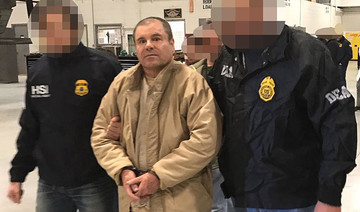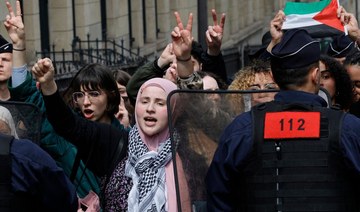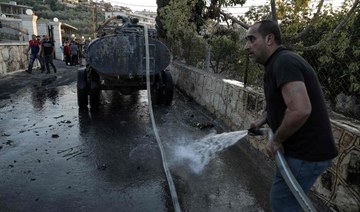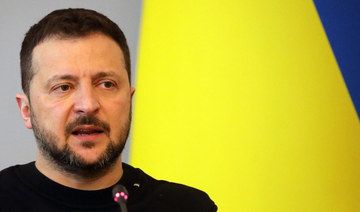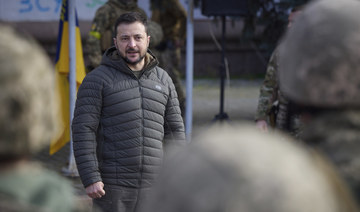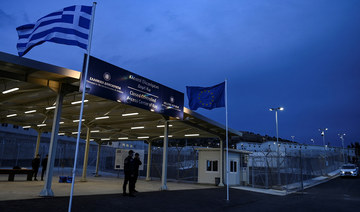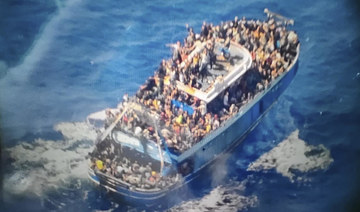NEW YORK: Jury selection at the US trial for Mexican drug lord Joaquin “El Chapo” Guzman was completed Wednesday with Guzman waiting for word on whether he can hug his wife for the first time in nearly two years.
A jury of seven women and five men are to hear opening statements Tuesday in the drug-conspiracy case against Guzman in federal court in Brooklyn.
Guzman has pleaded not guilty to charges accusing him of overseeing a drug cartel known for violence and for breaking him out of Mexican jails.
The notoriety has prompted security measures that include keeping the jurors anonymous. Guzman also has been held in solitary confinement and barred from seeing his wife out of concerns he could pass messages to his cohorts.
Earlier this week, a defense lawyer asked US District Judge Brian Cogan to grant a “humanitarian gesture” of letting Guzman greet his wife in the courtroom before the jury enters.
Allowing “an embrace with the railing between them would not pose a threat to security,” the letter read. The judge didn’t immediately rule on the request.
Most of the people picked either for the jury or to serve as six alternates said in initial screening that they had heard of Guzman through news reports or TV shows. They include a man and a woman said they are fluent in Spanish and a man who’s a retired corrections officer.
The judge put off swearing in the jurors until next week out of concern some still might try to duck duty for a trial expected to last into next year. He told lawyers that one of the jurors, after learning she was picked, wept while privately telling him she was afraid of the unwanted attention she would get if it was found out she was on the panel.
The woman was kept on after defense attorney Jeffrey Lichtman argued that dismissing her would set the precedent that jurors could get out service “with a few tears.”
Jury picked for US trial of Mexican drug lord El Chapo
Jury picked for US trial of Mexican drug lord El Chapo
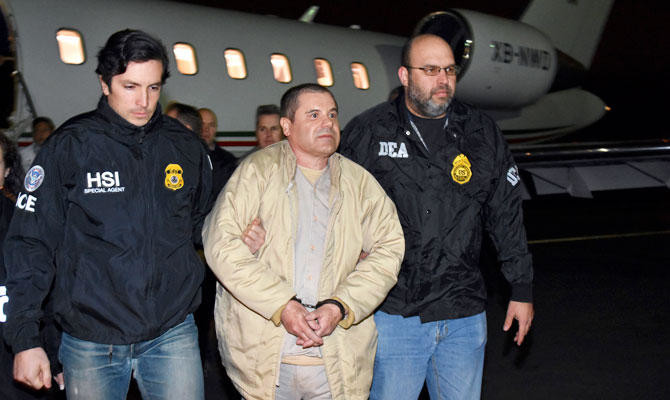
- Earlier this week, a defense lawyer asked US District Judge Brian Cogan to grant a “humanitarian gesture” of letting Guzman greet his wife in the courtroom before the jury enters
UN Human Rights Chief troubled by ‘heavy-handed’ action against protesters at US colleges
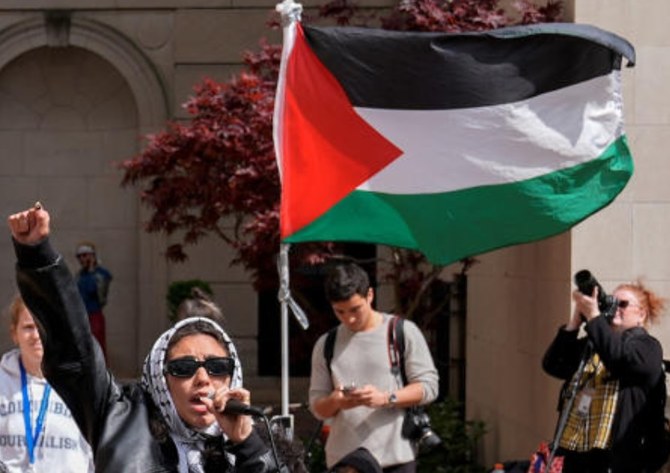
- Volker Turk says ‘freedom of expression and the right to peaceful assembly are fundamental to society, particularly when there is sharp disagreement on major issues’
- Protests have taken place on campuses in several states as students demand colleges withdraw investments from businesses involved in Israel’s assault on Gaza
NEW YORK CITY: The UN’s high commissioner for human rights on Tuesday said he is troubled by “a series of heavy-handed steps” taken by education authorities and law enforcement officials to break up protests at college campuses in the US.
Volker Turk said: “freedom of expression and the right to peaceful assembly are fundamental to society, particularly when there is sharp disagreement on major issues, as there are in relation to the conflict in the Occupied Palestinian Territory and Israel.”
Pro-Palestinian demonstrations have spread across college campuses in Texas, New York, Atlanta, Utah, Virginia, New Jersey, California and other parts of the US as students protest against the death toll during the war in Gaza, call for a ceasefire and demand authorities at their colleges withdraw investments from businesses involved in Israel’s military assault on Gaza.
Though largely peaceful, at some locations the protests have been dispersed or dismantled by security forces. Hundreds of students and teachers have been arrested, some of whom face charges or academic sanctions.
Turk expressed concern that some of the responses by law enforcement authorities at several colleges might have been disproportionate, and called for such actions to be scrutinized to ensure they do not exceed what is necessary “to protect the rights and freedoms of others.”
He added that all such actions must be guided by human rights law, while “allowing vibrant debate and protecting safe spaces for all.”
He reiterated that antisemitic, anti-Arab and anti-Palestinian activities and speech are “totally unacceptable, deeply disturbing (and) reprehensible.” However, the conduct of protesters must be assessed and addressed individually rather than through “sweeping measures that impute to all members of a protest the unacceptable viewpoints of a few,” Turk added.
“Incitement to violence or hatred on grounds of identity or viewpoints, whether real or assumed, must be strongly repudiated. We have already seen such dangerous rhetoric can quickly lead to real violence.”
Poland says it is probing alleged links between Orlen unit’s ex-CEO and ‘terrorist organizations’
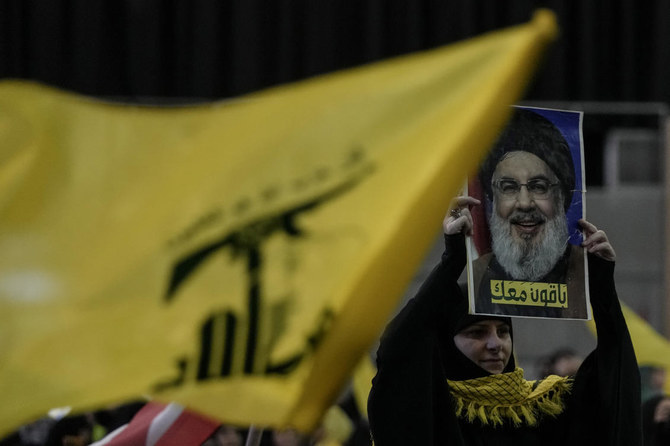
- Polish website Onet had reported on Monday that the former CEO of Orlen Trading Switzerland was suspected by Orlen’s internal security unit of having had contacts with Hezbollah
- The ex-CEO denied in an interview with Polish private radio RMF on Tuesday that he had any connections with Hezbollah
WARSAW: Poland has launched an investigation into multi-million-dollar cash losses by Polish refiner Orlen’s Swiss unit and allegations that its former CEO had ties to “terrorist organizations,” Warsaw chief prosecutor Malgorzata Adamajtys said on Tuesday.
Polish website Onet had reported on Monday that the former CEO of Orlen Trading Switzerland, referred to only as Samer A. due to local privacy laws, was suspected by Orlen’s internal security unit of having had contacts with Lebanon’s powerful Iran-backed Hezbollah militant group.
Samer A., the ex-CEO of Orlen’s Swiss subsidiary OTS, denied in an interview with Polish private radio RMF on Tuesday that he had any connections with Hezbollah.
“I have been to Poland many times, I am a Polish citizen, I have a Polish passport. I am treated by the current authorities as a second-class citizen,” he said, adding that though he was currently abroad, he was not hiding from Polish law enforcement.
Asked at a press conference for details of the investigation, chief prosecutor Adamajtys said: “We are looking into all information, some of which is known to prosecutors from the press, radio and television, including on connections with terrorist organizations.”
Western countries including the US designate Hezbollah as a terrorist organization. The European Union classifies Hezbollah’s military wing as a terrorist group, but not its political wing.
Adamajtys said OTS was established as a business despite a warning by Orlen’s internal security unit not to do so. It operated, according to Adamajtys, without proper supervision, documentation and verification of contractors. She said this showed that Samer A. should not have been appointed as CEO.
“A person who makes advance payments without completion of the first tranches of certain deliveries is not a good CEO and should not be the CEO of this or any other company,” she said.
Reuters sought to contact Samer A. for comment on Adamajtys’ remarks about OTS operations, but he could not be reached. In his conversation with RMF, he denied that there had been any warning from Orlen’s internal security unit.
OTS LOSSES
Orlen has said OTS was behind the loss of around $400 million linked to contracts to buy Venezuelan oil and oil products.
OTS has said it tried to benefit from a temporary window in US sanctions against Venezuela and paid cash advances to intermediaries it never worked with before. The contracts were canceled, it said, as a closure of the window was nearing, and tankers weren’t loading.
Orlen has said it is currently auditing OTS operations.
Adamajtys said Orlen also faced questions over the alleged manipulation of fuel prices to artificially low levels ahead of last year’s national election and a sale of some assets that investigators suspect were below market level.
In February, Orlen rejected an allegation of below-market asset sales from the state audit office, saying it gained as much as 9 billion zloty ($2.2 billion) in one corporate merger. The company also denied lowering fuel prices artificially.
Samer A. has been charged in a separate probe with VAT fraud between 2008-2013, a regional prosecutor in Bydgoszcz said on Monday. He was detained by police and questioned by a prosecutor in February, and released on bail, the prosecutor added.
Opposition critics said that under the previous, nationalist Law and Justice (PiS) government, which lost power in that vote, Orlen had helped financed the party’s policy agenda, including taking control of some media outlets.
On Monday, Prime Minister Donald Tusk said he had called the country’s chief prosecutor and secret services coordinator to discuss potential links between the former CEO of Orlen, Daniel Obajtek, and Hezbollah.
Obajtek, a close associate of PiS leader Jaroslaw Kaczynski, responded on social media platform X that Tusk was “looking for scandals where there are none.”
Polish media have reported that PiS might put up Obajtek as a candidate in June’s European Parliament election.
Forest fires raze parts of India amid heat, dry weather
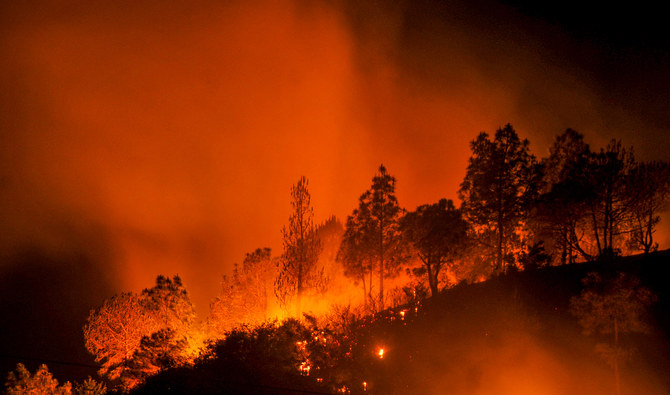
- As of 2021, 54.4 percent of forests in India experienced occasional fires, most of them due to man-made factors
- These fires have picked up again this year, with 653 incidents in Uttarakhand alone, government data shows
NEW DELHI: Frequent fires are razing forests in India’s Uttarakhand state in the north and Odisha in the east amid high temperatures and long dry spells, and the blazes have been worsened by people burning the forest to collect a flower used to brew alcohol.
Data from the state-run Forest Survey of India shows that as of 2021, 54.4 percent of forests in India experienced occasional fires, most of them due to man-made factors.
“Agriculture stubble burning, misconceptions and burning of shrubs to shoo away wildlife are major reasons behind the forest fires,” Swapnil Aniruddh, a forest official in Uttarakhand, told Reuters.
After a brief respite during the previous season from November to April, forest fires have picked up again this year, with 653 incidents in Uttarakhand alone, government data shows.
Odisha’s fires have been exacerbated by people setting parts of the forest ablaze to collect Mahua flowers, which are highly sought after as they are used to brew a popular liquor.
During the current season, 10,163 fire points in Uttarakhand have been detected using the government’s imaging radiometer.
Overall, loss of significant forest cover is a big worry for India as it tries to dramatically reduce its climate-changing emissions.
Among the organizations helping to curb the fires is the Indian Air Force, which has used the aerial firefighting ‘Bambi Bucket’ technique of collecting water from a nearby lake to spray over the region.
The situation may get worse, with India’s weather department predicting more heat-wave days than normal between April and June this year, along with a longer dry spell for Uttarakhand.
Pentagon chief pushes for donation of more Patriot systems to Kyiv

- “There are countries that have Patriots, and so what we’re doing is continuing to engage those countries,” Austin told a House Armed Services Committee hearing
WASHINGTON: US Defense Secretary Lloyd Austin said Tuesday he has been encouraging countries with Patriot missile systems to donate them to Ukraine, which has appealed for more of the air defense batteries.
“There are countries that have Patriots, and so what we’re doing is continuing to engage those countries,” Austin told a House Armed Services Committee hearing.
“I have talked to the leaders of several countries... myself here in the last two weeks, encouraging them to give up more capability or provide more capability,” he said, without identifying the countries by name.
Various European Union countries possess the systems, including Spain, Greece, Germany, the Netherlands, Poland and Sweden.
Ukrainian President Volodymyr Zelensky told NATO members earlier this month that his country needed a minimum of seven additional Patriot or other high-end air defense systems to counter Russian air strikes, urging them to step up their military assistance for Kyiv.
Greek court drops criminal charges against 35 international aid workers
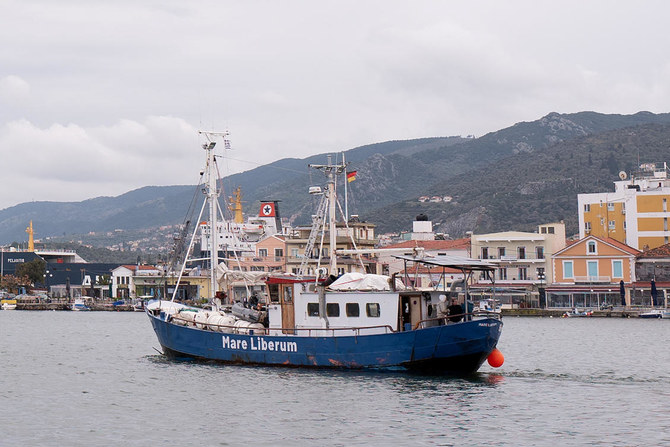
- The case was dropped due to inadequate evidence
- Greece was on the front line of a huge surge of refugees and migrants to Europe in 2015 and 2016
ATHENS: Greece has dropped criminal charges against dozens of international aid workers, ranging from spying to facilitating what authorities had called illegal entry into the country through the island of Lesbos, court documents showed on Tuesday.
Most of the 35 people, accused in 2020 of setting up a criminal organization and providing support to traffickers ferrying migrants, were German nationals. The rest included people from Norway, Austria, France, Spain, Switzerland and Bulgaria. They were arrested and had denied wrongdoing at the time.
The case was dropped due to inadequate evidence, the documents seen by Reuters showed.
“The detailed investigation of the case file has resoundingly quashed the police narrative which was pure fiction,” said Zaharias Kesses, a lawyer representing some of the aid workers.
Greece was on the front line of a huge surge of refugees and migrants to Europe in 2015 and 2016, many through its outlying islands close to Turkiye, including Lesbos. That flow has since ebbed.
The case was based on a 2020 operation by the Greek intelligence service EYP and the anti-terrorism unit with the code name Alkmini, and involved undercover agents who traveled as migrants from Turkiye to Lesbos.
Greek intelligence services were initially involved because the workers, who were using an alarm phone for migrants and asylum seekers in need of rescue at sea, were thought to have passed on information on Greek coast guard movements and vessel equipment.
But a magistrate’s investigation concluded the information and visual material collected were not confidential.
“There is not enough evidence to support the accusations against the defendants,” the documents said.


